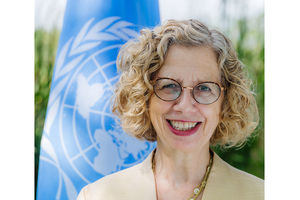UN report maps path to profit from waste management

Susan Wangui 60 collecting plastics bottle waste for the purpose of recycling and selling at Gioto dumpsite in Nakuru city on July 16, 2022.
What you need to know:
- With the global waste crisis looming, the report is a stark reminder of the urgent need for concerted global action.
- The solutions are within reach, but decisive leadership and commitment are imperative to secure a sustainable and livable future for future generations.
A new report released by the United Nations Environment Programme (Unep) paints a concerning picture of the world's mounting waste crisis, urging immediate and drastic action to prevent its severe consequences.
The report titled "Beyond an Age of Waste: Turning Rubbish into a Resource" predicts a two-thirds surge in municipal solid waste generation within a generation, with costs nearly doubling if left unchecked.
The Global Waste Management Outlook 2024 (GWMO 2024) reports different scenarios based on life cycle assessments. It is the most comprehensive global waste generation and management update since 2018. The report paints a bleak picture of the future if current trends continue.
Municipal solid waste is expected to rise from 2.3 billion tonnes in 2023 to an astonishing 3.8 billion tonnes by 2050.
The report also highlights the financial implications of inadequate waste management. While the estimated direct cost of waste management in 2020 was USD 252 billion, the actual cost jumps to USD 361 billion when hidden costs such as pollution, health impacts and climate change associated with poor waste disposal practices are factored in. Without prompt action, this annual cost could almost double to a staggering USD 640.3 billion by 2050.
Kenya, a nation striving for sustainable development, exemplifies the challenges and opportunities highlighted in the GWMO 2024. The country's rapid urbanisation and economic growth have significantly increased waste generation, particularly in major cities like Nairobi.
According to a 2021 report by the Kenyan National Environment Management Authority, Nairobi generates an estimated 4,000 tonnes of waste daily, with only about a third being collected and disposed of properly.
Improper waste disposal is a significant environmental and health hazard. For instance, in Nairobi, overflowing landfills and open dumpsites pollute water sources and air, leading to respiratory illnesses and other health problems. This is worsened by informal garbage collectors who often lack proper equipment and safety measures, putting themselves and surrounding communities at risk.
However, Kenya is taking steps to address this issue. The National Waste Management Strategy 2015-2030 provides a framework for promoting waste reduction, reuse and recycling. The "Clean Kenya Campaign," launched in 2018, is an initiative to improve waste collection and raise public awareness about responsible waste management practices.
The GWMO 2024 emphasises the critical role of leadership in navigating towards a "zero waste" future. Inger Andersen, the executive director of Unep, highlights decision-makers' responsibility in both public and private sectors. "Waste generation is intrinsically tied to GDP, and many fast-growing economies are struggling under the burden of rapid waste growth," states Andersen.
"This Global Waste Management Outlook can support governments in creating more sustainable societies and securing a livable planet for future generations."
The report also emphasises the importance of collective action and innovative solutions. Carlos Silva Filho, President of the International Solid Waste Association, echoes this sentiment, highlighting the urgency for transformative solutions.
"The GWMO 2024 is a guide and a call to action to catalyse collective efforts to revert the adverse impacts of current waste management practices," Silva Filho asserts.
The report suggests that by implementing waste prevention and management measures, net annual costs could be limited by 2050. Adopting a circular economy model would bring significant economic and environmental benefits. This model prioritises waste reduction, sustainable business practices and efficient waste management, aiming to separate waste generation from economic growth. According to the GWMO 2024, a circular economy model could generate a net gain of USD 108.5 billion annually by 2050.
The report concludes with a strong call to action for a global paradigm shift towards zero waste. Lead author Zoë Lenkiewicz emphasises the urgency for change. "The findings of this report demonstrate that the world urgently needs to shift to a zero waste approach," Lenkiewicz asserts.
"What is needed now is strong leadership to set the direction and pace required and to ensure no one is left behind."
With the global waste crisis looming, the report is a stark reminder of the urgent need for concerted global action. The solutions are within reach, but decisive leadership and commitment are imperative to secure a sustainable and livable future for future generations.
The report was launched at the just concluded 6th United Nations Environment Assembly.





